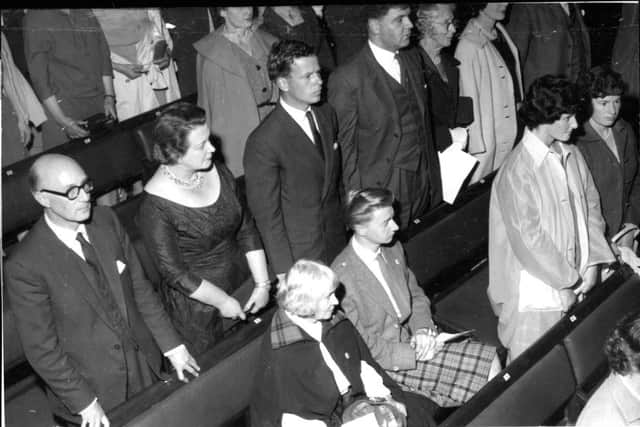Allan Massie: Anthems only divide our nation


When I was a boy in Aberdeenshire there was no question as to what was our national anthem. It was God Save the King, with Queen replacing King in February 1952. The sense of Britishness was strong. Though the air battles of 1940 were fought mostly over the South of England, collectively they were known as “the Battle of Britain” because people understood that it was the safety and liberty of the whole United Kingdom which were at stake.
In those days, though the National Anthem was regularly played in theatres and cinemas, its playing was otherwise regarded as a solemn business. My memory is that few people sang the words; silence was more impressive, seemed more fitting. One of my grandmothers would stand to attention even when it was played on the radio.
Advertisement
Hide AdAdvertisement
Hide AdIt was also played on sporting occasions, before the kick-off at rugby and (I think) also football internationals. Again the crowd stood silently to attention, men removing their hats as a mark of respect. There was no suggestion that it was played to inspire the players or to inflame the partisanship of the crowd. When what were still usually termed the “Home” nations met each other, it was the only anthem. It didn’t belong to either of the teams. When France came to Murrayfield, Twickenham or Cardiff Arms Park and, I presume, to Lansdowne Road in Dublin, the Marseillaise was also played as a mark of respect for the visitors. I can’t remember what anthem was played at Ireland’s home games, some of which still took place in Belfast, for Irish rugby was in the unusual position of not having been affected by the Partition of 1922.


It was the Welsh who first broke ranks, playing Land Of My Fathers to inspire team and crowd. Agitation for a comparable Scottish anthem followed, the demand growing in intensity as nationalist feeling developed. Elements in the crowd at Murrayfield began to boo God Save the Queen, though it was not clear whether they were doing so because it was the British National Anthem or because they regarded it as English.
The conservatively minded Scottish Rugby Union held out for some time, publicly deploring what they called “bad manners”. But eventually they gave way, and so we got Flower of Scotland. Meanwhile the RFU at Twickenham obstinately stuck with God Save the Queen even though the purpose of playing an anthem had evidently changed. Those, Scottish Unionists among them, who suggested it was time the English had an anthem of their own, were ignored. The unfortunate consequence of this English arrogance, or, if you prefer, indifference, and refusal to make a distinction between what is properly British and what English, has been that more and more people now regard God Save the Queen as England’s anthem rather than the National Anthem of the United Kingdom.
Meanwhile, as the correspondence columns of this newspaper attest, argument continues as to whether the somewhat dirge-like Flower of Scotland with its Kailyardish line about “their wee bit hill and glen” is an appropriate anthem for Scotland today. Some object to the celebration of a battle 700 years ago, but I’ve never much minded this. National anthems are rarely politically correct. The American Star-Spangled Banner recalls an American defeat of the British in the War of 1812, and the Marseillaise was a song of the Great Revolution which divided Frenchmen then, and some would say, continues to do so. In any case the most popular alternative to Flower of Scotland, Scots wha hae is even more directly connected to that battle.
Some years ago I suggested that the real Scottish anthem might be one of our metrical Psalms, probably Psalm 23, The Lord’s my Shepherd sung to the beautiful tune Crimond, or perhaps Psalm 121, I to the hills will lift mine eyes sung to the equally beautiful tune French. Certainly these were national songs of Presbyterian Scotland (which of course rather left out Catholic Scotland). I might have remarked also that the 23rd Psalm is – or was? – sung at many, perhaps even most, Scottish funerals – and what therefore could be better suited to occasions at Murrayfield or Hampden? Still, even perhaps 20 years ago, I recognised that the idea was a non-starter; and it is more so now when Presbyterian Scotland and the Presbyterian ethic are so evidently withering.
Some who dislike Flower of Scotland and regard the sentiments as unsuited to the modern world would like to have a new anthem commissioned, one fit for our egalitarian Scotland opposed to all forms of discrimination against, well, anything really. This is almost certainly a rotten idea. Apart from anything, the precedents are off-putting, new recent anthems such as Advance, Australia Fair being usually dreadful. (Actually, I discover that, though not adopted as Australia’s anthem till 1984, it was written by a Scots composer, Peter Dodds McCormick, more than 100 years previously. This doesn’t however make it any better; it’s still awful.)
The sentiments of Burns’s great hymn to the Brotherhood of Man are of course appealing, though perhaps better suited to the United Nations or – dare I say? – the European Union than to one nation’s anthem, but I’m not sure that it lends itself to communal singing, which, it seems, is what is wanted for an anthem, now that we no longer stand silently to attention as my grandmother used to.
So, given that Scotland the Brave, words by Cliff Hanley, tends to be scornfully dismissed as “a music-hall song” (though I’ve always found it at least agreeably cheerful), I reckon we are probably stuck with Flower of Scotland for sporting occasions anyway. It has the merit that people seem to like it, and are happy to sing it, even though it usually comes across as more mournful than inspiring, as if the singers didn’t really believe that we could indeed rise now and be the nation again, etc.
Advertisement
Hide AdAdvertisement
Hide AdThe alternative, and it is perhaps a good one, is to adopt a song that has nothing to do with nationhood at all. The SRU has recently encouraged people to sing Loch Lomond during the half-time interval at Murrayfield, and a good part of the crowd at least seems to respond cheerfully. It’s a good tune and expresses sentiments that nobody surely can find reason to object to. Of course there are some of us who still consider God Save the Queen to be our national anthem – but this is, I suppose, a politically divisive statement; so no good.